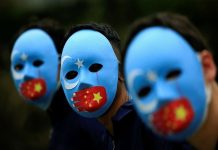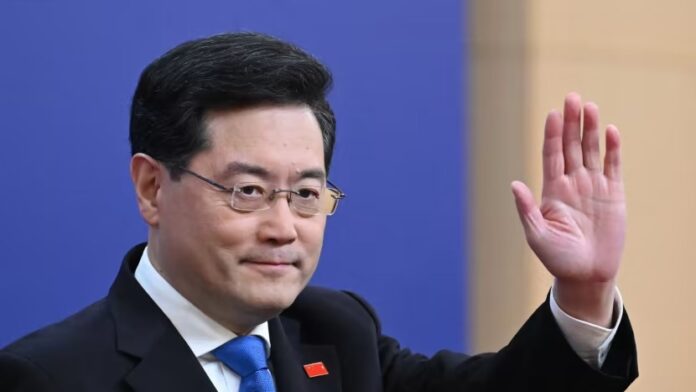HONG KONG: It is like watching a political satire show, except that it’s not. Qin Gang, China’s newly minted foreign minister and a high-flying political star, has disappeared from public view since Jun 25.
Speculation about his political future and personal well-being started to gather pace after a foreign ministry spokesperson claimed on Jul 11 that Qin was unable to attend the ASEAN foreign ministers’ meeting due to “health reasons”.
That claim came after Beijing postponed a trip by European Union foreign policy chief Josep Borrell, scheduled for the second week of July. Borrell was supposed to meet Qin to reduce misunderstandings between the two sides.
In the ensuing two weeks, speculation about Qin’s whereabouts became more intense but China’s state media remained conspicuously silent.
FARCICAL AWKWARDNESS IN THE AIR
Foreign ministry spokesperson Mao Ning drew the short straw and had to face Qin-related questions at the daily press briefing. From the short videos being circulated online, one could feel the farcical awkwardness in the air whenever a Qin-related question arose.
Often, for a few seconds, Mao would pretend to look at and reshuffle her prepared notes or ask a reporter to repeat the question before giving her standard reply: “I don’t have any information to offer”, or “I have no knowledge of that issue”.
On Jul 17, when asked to confirm whether Qin was still the foreign minister, Mao told the reporter to check the ministry’s website which listed Qin as the foreign minister and said she did not have any new information. So, a foreign ministry spokesperson could not directly confirm the foreign minister was still the foreign minister, and a reporter had to check the ministry’s website to confirm he was?
Mao has my sympathy, though. She knew the Qin-related questions would pop up every day she walked into the briefing room, but apparently, she was not authorised to say anything on that matter, not even to confirm that Qin was still foreign minister even though on paper he was.
Also, Mao’s exchanges with foreign reporters over Qin were all excluded from the readouts in the ministry’s website, keeping up the charade that “China’s diplomatic activities are moving forward normally”.
OLD HABITS DIE HARD
The shoe finally dropped on Tuesday (Jul 25) when the National People’s Congress Standing Committee replaced Qin with Wang Yi, his predecessor. At the briefing next day, Mao continued her stonewalling strategy by referring reporters to Xinhua reports as to why her former boss was removed – but Xinhua reports did not give any reason.
Meanwhile, the ministry was busy scrubbing Qin’s name and speeches from the official website, as if his seven-month tenure had not happened at all. One section which listed China’s foreign ministers since the People’s Republic was founded in 1949 no longer includes Qin. He was only listed as China’s ambassador to the United States from 2021 to 2023.
On Friday, the ministry quietly began to reinstate references to Qin which were erased on Tuesday, apparently because of intense media scrutiny. But the damage was done.
Old habits die hard. The ministry’s actions remind me of the antics popular in the heyday of Mao Zedong after leaders were purged. Such moves are counterproductive and ridiculous.
Equally counterproductive is the official stonewalling on why Qin was removed. Speculation has run amok in the absence of an official explanation, with suggestions that his dismissal was politically motivated and or that he was implicated in an extramarital affair.
This could be an acute embarrassment for China’s top leadership. It is also possible that he is unwell.
ON A ROCKET-PROPELLED CAREER PATH PRIOR TO HIS DOWNFALL
Before his downfall, Qin appeared to be on a rocket-propelled career path. He was believed to have earned the trust and confidence of President Xi Jinping after he became the foreign ministry protocol department’s director general in 2014.
After he was promoted to assistant foreign minister in 2017 and vice-foreign minister in 2018, he continued to oversee diplomatic protocols, playing a key role in Xi’s reception of visiting foreign leaders.
The decision to replace Qin with Wang was meant to signal stability and continuity of China’s foreign policies. Wang was China’s foreign minister from March 2013 to December 2022.
At the end of his tenure, Wang was elevated to become director of office of the Communist Party’s foreign affairs commission – making him the highest-ranking diplomat in China. The commission is headed by Xi himself.
RAISES QUESTIONS ABOUT CHINA’S POWER POLITICS
The saga surrounding Qin has raised questions about China’s power politics. Some might see his removal as a sign of weakness. This line of thinking is off the mark. The fact that Xi could remove Qin easily is a sign of political strength, as was the fact he could promote him rapidly through a hierarchy which values seniority.
Also, Qin’s removal and Wang’s reappointment are unlikely to signal any policy shift. Under Xi’s ironclad leadership, he alone makes all the important decisions. China’s foreign minister operates more like an executor of policies.
Having said that, speculation surrounding the saga has damaged China’s reputation and image as a responsible world power. China might be treating the whole saga as a domestic affair, which is true in a certain sense.
But, as the world’s second-largest economy and a rising power at odds with the West over almost everything from values to technology, the rest of the world has a valid interest in China’s decision-making process.
As I was writing this column, my mind kept shifting to a phrase popularised by Deng Xiaoping: Seeking truth from facts. Deng frequently used that slogan to break barriers of ultra-leftist influences to push for reform and opening up in the 1980s and 1990s.
In Qin’s case, if the government had come clean with the reasons for Qin’s dismissal and been willing to address questions from the media, it might have incurred nothing more than embarrassment. By stonewalling on the issue, China has suffered much more than embarrassment.

































